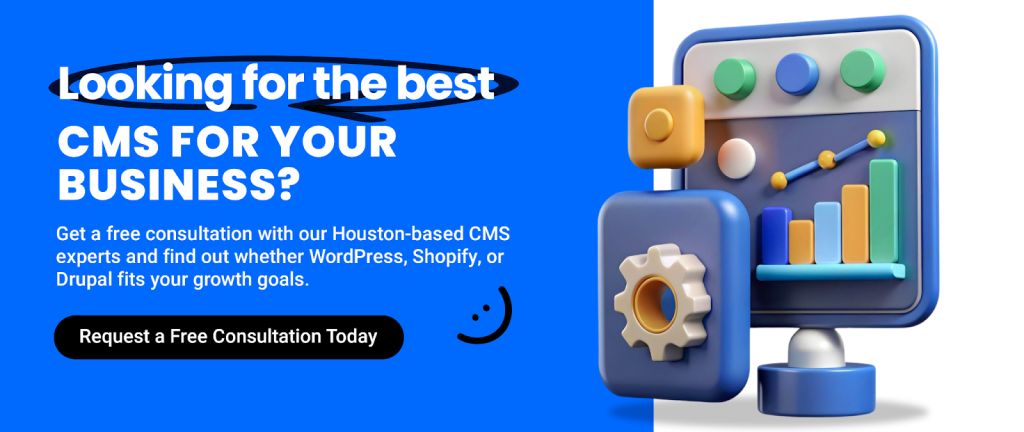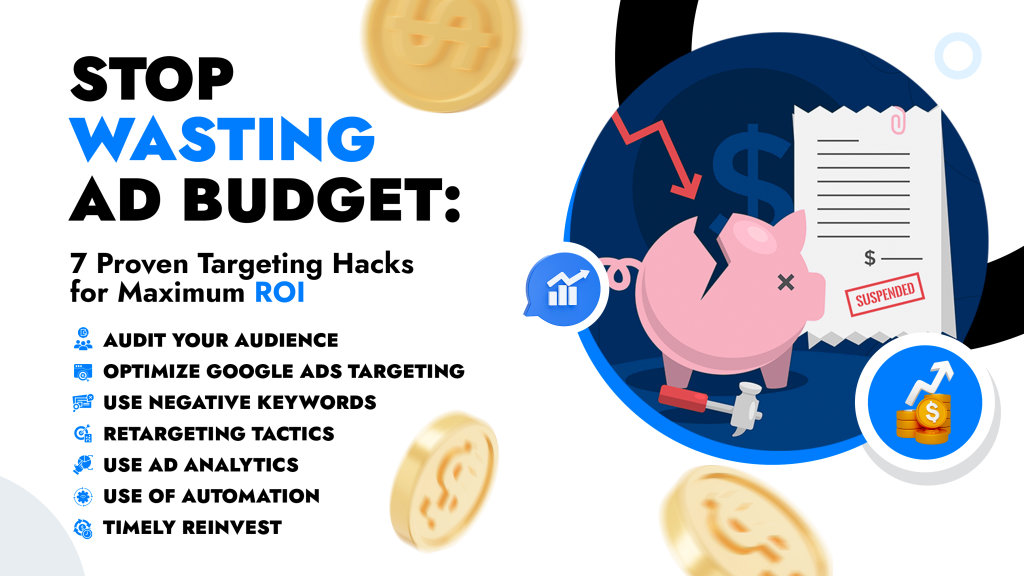When it comes to starting a new website, one of the most important decisions a business makes is, “Which content management system (CMS) should I use?” and picking the right CMS development company in Houston for your e-commerce site has become increasingly important these days.
For U.S. businesses, the most common choices are WordPress, Shopify, and Drupal. Each platform offers powerful tools, but the “best” option depends on your business type, goals, and technical needs.
Choosing the right CMS development company in Houston is just one part of building a strong online presence. Understanding the top web development services in the USA can help you align your CMS choice with your long-term goals.
Why CMS Choice Matters
Your CMS determines:
- Ease of use: how quickly your team can update content.
- Customization: whether your site looks unique or like a template.
- Scalability: Can the system grow with your business?
- Security: how protected you are from cyberattacks.
- Costs: both upfront and ongoing.
A wrong choice can result in wasted time, increased costs, and missed opportunities. Let’s explore why.
If you’re wondering whether to invest in a CMS or a custom-built solution, our guide on why custom web development is better than templates explains how customization affects performance and scalability.
1. WordPress: The Master of Versatility

WordPress was launched in 2003 by Matt Mullenweg and Mike Little as an open-source blogging tool. WordPress has evolved into the world’s most popular CMS, powering approximately 43% of all websites. CMS development for small businesses USA popularity lies in its user-friendly interface and extensive ecosystem of themes and plugins.
WordPress is compatible with most web hosting providers. Among CMSs, WordPress commands over 61.3% of the CMS market, making it the clear leader in flexibility and adoption (WordPress market share in 2025).
- Market Share: Powers over 40% of websites worldwide.
- Best For: Blogs, small-to-medium business sites, and heavy-content websites.
- Strengths:
- 60,000+ plugins for SEO, e-commerce, and content tools.
- Beginner-friendly dashboard for non-developers and Houston web developers.
- Endless customization with themes and builders.
- Limitations:
- Security risks if plugins aren’t updated.
- Performance can lag on large, complex sites.
2. Shopify: Convenient E-commerce

Shopify launched in 2006 in Canada. Shopify was created by Tobias Lütke, Daniel Weinand, and Scott Lake to provide a simple solution for building online stores. Shopify CMS development company USA has experienced exponential growth, becoming a global leader in e-commerce.
It is especially popular among entrepreneurs and small businesses seeking a fast, intuitive solution for selling online without worrying about technical details. With its drag-and-drop interface, ready-made templates, and integrations with marketplaces like Amazon or eBay, Shopify is ideal for users prioritizing simplicity.
- Market Share: Leading platform for small to mid-sized e-commerce brands.
- Best For: Businesses focused on online stores.
- Strengths:
- All-in-one e-commerce solution (inventory, payments, shipping).
- Secure cloud hosting + 24/7 support.
- Scales easily for growing catalogs.
- Limitations:
- Limited design flexibility compared to WordPress/Drupal.
- Transaction fees (unless using Shopify Payments).
- Not ideal for content-heavy websites (blogs, publications).
When comparing Shopify’s pricing model, it’s helpful to look at understanding web development costs and scalability to see how different CMSs fit your budget.
3. Drupal: For Complex and Tailored Sites

Drupal was created in 2001 as a university project by Dries Buytaert. Designed initially as an online discussion platform, it quickly became a powerful open-source CMS and the best CMS development services in the USA, suited for complex websites requiring advanced customization. With thousands of available modules, Drupal offers nearly unlimited flexibility.
Its modular approach sets it apart from competitors. Rather than providing an out-of-the-box solution, Drupal offers a solid base that developers can tailor to specific project needs. This makes it a popular choice for large institutions, governments, and organizations requiring robust security and custom web development.
- Market Share: Smaller than WordPress but trusted by enterprises and governments.
- Best For: Large organizations with complex content structures or high-security needs.
- Strengths:
- Enterprise-level security and data protection.
- Scalable architecture for high-traffic sites.
- Developer-friendly for complex customizations.
- Limitations:
- Steeper learning curve (requires developer support).
- Smaller community compared to WordPress.
- More expensive to maintain.
Looking to build a powerful website in Texas that fits your business goals? Talk to our web development experts at Code & Design Group for tailored CMS solutions.
Best CMS For Small Business USA
| Features | WordPress | Shopify | Drupal |
| Ease of Use | Beginner-friendly | Beginner-friendly (for stores) | Developer-focused |
| Best For | Blogs, SMBs, content sites | E-commerce stores | Enterprise, government, large orgs |
| Design Flexibility | Very high (themes + plugins) | Moderate (templates & apps) | Very high (custom builds) |
| E-commerce Support | With the WooCommerce plugin | Built-in, native features | Custom modules required |
| Security | Moderate (plugin risks) | High (managed hosting) | Very high (enterprise-grade) |
| Cost | Low to medium | Monthly fee + transaction costs | High (custom dev + hosting) |
| Scalability | Good for SMBs and mid-size | Excellent for scaling stores | Excellent for complex systems |
Today, approximately 68.7% of all live websites leverage a CMS rather than static or hand-coded architectures (2025 CMS usage statistics).
Emerging CMS Trends in 2025
- Headless CMS is on the rise—faster performance and easier omnichannel content delivery.
- AI-powered automation—WordPress and Drupal now use AI for content creation and SEO optimization.
- Hybrid CMS demand is growing—it combines the flexibility of traditional CMS with headless speed.
- Personalization & analytics focus—data-driven experiences for better engagement.
- Cloud-first adoption—scalable, secure hosting for global performance.
How to Choose the Right CMS?
- Choose WordPress if…
You’re a small-to-medium business, blogger, or service provider who needs a content-rich site with the flexibility to add features over time. - Choose Shopify if…
You’re focused on selling products online and want an all-in-one solution that’s simple to set up and manage. - Choose Drupal if…
You’re an enterprise or government organization handling sensitive data, high traffic, or needing highly customized digital experiences.
CMS Pricing Overview
| CMS Platform | Setup Cost (Avg.) | Monthly Maintenance | Hosting | Best For |
| WordPress | $1,000–$5,000 | $50–$200 | Separate | Small- to mid-sized businesses, blogs |
| Shopify | $39–$399 (plan-based) | Included | Included | E-commerce stores |
| Drupal | $5,000 – $25,000+ | $200–$800 | Separate | Enterprises, governments |
Final Thoughts
There’s no one-size-fits-all CMS. The best choice depends on your goals, technical expertise, and growth plans. Whether you’re launching a simple website, scaling an e-commerce store, or building an enterprise-grade platform, investing in affordable CMS development services in Houston will set the stage for sustainable online success.
- If you’re a small business, WordPress and Shopify will cover most needs.
- If you’re a large enterprise, Drupal provides unmatched security and scalability.
Before choosing a CMS development agency, remember your CMS is more than just software—it’s the foundation of your digital presence.
From WordPress to Shopify to Drupal—we build it all. Let’s build your perfect CMS together.
Frequently Asked Questions
Q1. What is the most popular CMS?
WordPress continues to dominate the CMS market with over 40% market share, making it the most popular choice worldwide for blogs, small businesses, and content-driven websites.
Q2. Is Shopify better than WordPress for e-commerce?
Yes—if your main focus is selling products online, Shopify is often better because it’s built for e-commerce. However, WordPress with WooCommerce offers more flexibility if you also want content-heavy features like blogs.
Q3. Is Drupal only for large organizations?
Not necessarily, but Drupal is most effective for enterprises, governments, or universities that need high security, advanced workflows, or custom integrations. Small businesses may find Drupal too complex and expensive.
Q4. Which CMS is the most secure?
Drupal is considered the most secure due to its enterprise-grade protocols and government adoption. Shopify also provides strong built-in security. WordPress can be secure if plugins are updated regularly and security measures are implemented.









